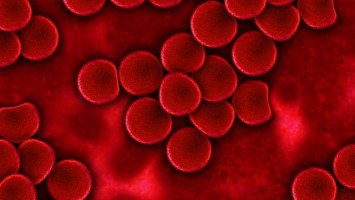
Researchers conducting a Phase 2 clinical trial at Sylvester Comprehensive Cancer Center at the University of Miami Miller School of Medicine say a new combination of antibody therapies produced a ‘surprisingly high’ response rate in patients with high-risk follicular lymphoma, a type of non-Hodgkin lymphoma.
Based on these initial findings – reported in an oral presentation at the 65th ASH Annual Meeting and Exposition in San Diego, California, Dec. 9-12 – the research team plans to expand the number of trial participants at Sylvester and into other cancer research centers. ASH is the yearly conference of the American Society of Hematology.
Most often, follicular lymphoma is slow-growing, or indolent, with high survival rates. Although there is no cure, most patients will live with the disease – either in remission or in active treatment for the rest of their lives. But for a subset, the lymphoma can grow more quickly, and outcomes may be worse.
The initial analysis of the clinical trial pairing the antibodies loncastuximab and rituximab found that 96% of high-risk patients had some response to treatment, and 85% had a complete response, meaning their cancer could no longer be detected by imaging. So far, the study has enrolled 33 follicular lymphoma patients at Sylvester out of a targeted 39 – the ASH presentation is based on analysis of 27 of those patients – but with the unexpectedly high response rate, the researchers plan to expand the trial to enroll a total of 100 patients at Sylvester and at other cancer centers.
“It’s a high-risk population, and we’re trying to improve outcomes for these patients,” said Dr. Juan Pablo Alderuccio, an associate professor of medicine and haematologist at Sylvester, first author and presenter of the abstract, which ASH has designated a clinically relevant presentation.
Slightly more than half of the patients in the Sylvester trial had what’s called POD24, meaning they had progression of their disease within the first 24 months after initial treatment. For follicular lymphoma, this early progression is often a bad sign and is linked to higher risk of dying from the disease. The remaining patients were those deemed high-risk or with advanced disease by other clinical measures.
Alderuccio and abstract senior author Dr. Craig H. Moskowitz, physician-in-chief for Oncology at Sylvester, said the research team was pleased with the surprisingly high response rates. They designed their trial in stages, where they needed a certain number of complete responses in the first, smaller stage before progressing on to the second. They enrolled 19 patients for this first stage with the goal of seeing seven with complete responses — but those seven complete responses came after only the first 10 patients had been treated.
Those percentages have held up as they’ve moved to the second stage of the trial. Now, the team is looking for other centers to participate in the larger, multicenter trial that will test the two antibodies on a total of 100 patients.
“If we’re able to observe the same good results in this larger group, hopefully, this treatment will be available for every patient down the road,” Alderuccio said.
While rituximab has been a mainstay follicular lymphoma treatment for decades, loncastuximab is a novel antibody-drug conjugate targeting a protein that is ubiquitously expressed in follicular lymphoma. When the researchers launched the study, they hoped loncastuximab would help provide durable responses through a synergistic interaction with rituximab.
The current clinical trial came after a Phase 1 trial conducted elsewhere that tested loncastuximab alone for patients with B-cell lymphomas including follicular lymphoma. That trial showed promising if less dramatic results — a complete response rate of around 64%. Loncastuximab alone has also proved to be effective in trials for other lymphomas, including diffuse large B-cell lymphoma, an aggressive blood cancer. There is also unpublished data from animal studies that hinted that this combination might work for follicular lymphoma, Alderuccio said.
Authors: Affiliated with Sylvester Comprehensive Cancer Center and/or University of Miami and/or University of Miami Miller School of Medicine: Juan Pablo Alderuccio, MD; Alvaro J. Alencar, MD; Jonathan H. Schatz, MD; Russ Kuker, MD; Georgio Pongas, MD; Isildinha M. Reis, PhD; Jay Y. Spiegel, MD; Laura Medina Andara; Lazaros J. Lekakis; Joseph S. Gyedu; Amer M. Beitinjaneh, MD, MS; Nathalie Padron; Izidore S. Lossos, MD; Joseph D. Rosenblatt, MD; David S. Lessen, MD; and Craig H. Moskowitz, MD. Affiliated with H. Lee Moffitt Cancer Center at Memorial Cancer Institute, Ft. Lauderdale, Florida: Jose Sandoval-Sus, MD.
Conflicts and disclosures: A full list of disclosures is included with the abstract.
The World Cancer Declaration recognises that to make major reductions in premature deaths, innovative education and training opportunities for healthcare workers in all disciplines of cancer control need to improve significantly.
ecancer plays a critical part in improving access to education for medical professionals.
Every day we help doctors, nurses, patients and their advocates to further their knowledge and improve the quality of care. Please make a donation to support our ongoing work.
Thank you for your support.